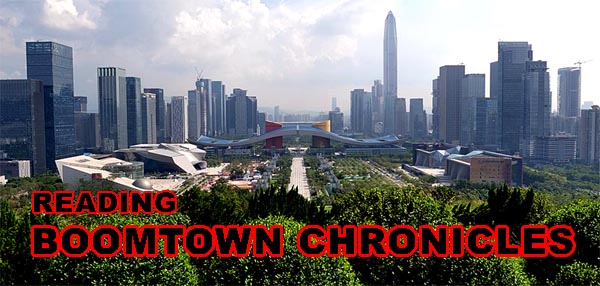 |
| Shenzhen, the Boomtown (Wikipedia) |
Note: Between Lesson #01-128 and #01-207, I wrote 72 lessons explaining expressions in articles published in the Shenzhen Daily. Read more about "Reading Boomtown Chronicles."
Get Ready: Who is at the helm of your school or company?
Boomtown Chronicles Part V - published Monday, July 14, 2008 (cont.)
- Yang Geng was an "official-cum-entrepreneur."
cum: Latin for "with," and is sometimes found in this rather rare "A-cum-B" construction. It's used to describe a person who fills two (often very different) roles. You wouldn't say "my manager-cum-boss," because they mean basically the same thing. But if you said, "He's a boxer-cum-piano player," you'd be right on the point. We also find "cum" reflected in certain prefixes, like com- and con-, but here it is in its pure Latin form.
- Yang Geng was "at the helm of the Shekou Industrial Zone."
helm: a ship's steering wheel, the so the expression means that Yang Geng was steering, or guiding, Shekou. (This is a suitably nautical expression: Shekou is, after all, a port!)
- Yang Geng brought "seismic" changes to Shekou's economy.
seismic: from the Greek seismos meaning earthquake; the writer is saying that these changes were "earthshaking."
- A Shanghai shipyard was "floundering."
floundering: failing or declining. The word comes from the idea of stumbling around helplessly, like a person who is drowning. Its association with drowning would be an especially bad thing for a shipyard!
- Yang Geng made a proposal to "to turn around the moribund China Merchants Group."
moribund: near death, or on the verge of extinction. This is also passive vocabulary (most people know its meaning but seldom use it). It means China Merchants Group was beyond floundering--it was about to drown!
- Shekou is located on the Nantou Peninsula.
peninsula: the next thing to an island, or almost an island. Insula is the Latin word for "island." We find it in phrases like "insular thinking," meaning isolationism, but also in words like "insulation," a material used inside walls to isolate the inside of a building from the outside, keeping it from being affected by the outside weather. Pen- is a prefix meaning "almost" or "next (to)"; "penultimate" means the next-to-last. So a peninsula, "almost an island," has three sides surrounded by water. (Interestingly, the Chinese word for peninsula, bandao, meaning "half island.")
--------Read more: https://en.wikipedia.org/wiki/Shenzhen
Practice: Choose the correct term to fill in the blank in the sentence below:
- cum
- floundering
- helm
- moribund
- peninsula
- seismic
- The hotel was located next to the sea, at the end of a beautiful ________.
- When the president retired, her vice president stepped up and took the ________.
- The drunk was ________ around on the street until the police arrested him.
- The pandemic has caused a ________ change in the way we socialize.
- When digital technology was introduced, the market for film cameras became ________.
- He saved his money to open a bookstore-________-café.
Answers are in the first comment below.
Submitted to the Shenzhen Daily for July 22, 2008


Answers to the Practice: 1. f; 2. c; 3. b; 4. e; 5. a; 6. d
ReplyDelete